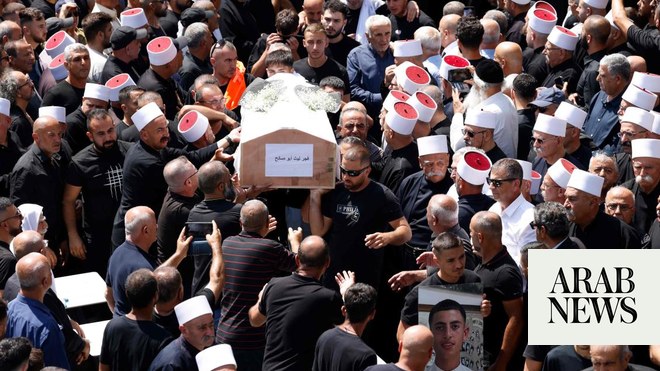TEL AVIV, Israel: A rocket strike on a soccer field on Saturday killed at least 11 children and teenagers, Israeli authorities said, in the deadliest strike on an Israeli target along the country's northern border since fighting began between Israel and the Lebanese militant group Hezbollah. . This raised fears of a wider regional war.
Israel blamed Hezbollah for the attack on the Israeli-controlled Golan Heights, but Hezbollah was quick to deny any role. Israeli Prime Minister Benjamin Netanyahu warned that Hezbollah “will pay a heavy price for this attack that it has not yet paid.”
Israel's top military spokesman, Rear Admiral Daniel Hagari, called it the deadliest attack on Israeli civilians since the October 7 attack by Hamas that sparked the Gaza war. He said another 20 were injured.
“There is no doubt that Hezbollah has crossed all the red lines here, and the response will reflect that,” Israeli Foreign Minister Israel Katz told Israel's Channel 12. “We are approaching the moment when we will face all-out war.”
Hezbollah's chief spokesman, Mohammed Afif, told the Associated Press that the group “categorically denies that it carried out the attack on Majdal Shams.” Unusually, Hezbollah denies the attack.
The attack at the soccer field just before sunset followed earlier cross-border violence on Saturday, when Hezbollah said three of its fighters were killed, without specifying where. Israel's military said its air force struck a Hezbollah weapons depot in the border village of Kfar Kila, adding that gunmen were inside at the time.
Hezbollah said its fighters carried out 10 different attacks using rockets and explosive drones against Israeli military posts, the latest of which was targeting the army headquarters of the Haramoun Brigade in Maaleh Golani with Katyusha rockets. In a separate statement, Hezbollah said it hit the same military post with a short-range Falaq missile. It said the attacks were in response to Israeli airstrikes on villages in southern Lebanon.
The office of Netanyahu, who was visiting the United States, said he would cut his trip short by a few hours, without specifying when he would return. He stated that he would convene the security cabinet upon arrival.
Far-right members of Netanyahu's government have called for a tough response against Hezbollah. But an all-out war with a militant group with far superior firepower than Hamas would be trying for the Israeli military after nearly 10 months of fighting in Gaza.
Footage broadcast on Israel's Channel 12 showed a large explosion in one of the valleys in the Druze town of Majdal Shams in the Golan Heights, which Israel captured from Syria in the 1967 Middle East war and annexed in 1981. Some Druze hold Israeli citizenship. Many still sympathize with Syria and have rejected Israeli annexation, but their ties to Israeli society have grown over the years.
The video showed paramedics rushing stretchers from the football field towards waiting ambulances.
Resident Ha'il Mahmoud told Channel 12 that children were playing soccer when the rocket hit the field. He said a siren could be heard seconds before the missile hit, but there was no time to take cover.
Jihan Sfadi, the principal of the primary school, told Channel 12 that five students were among the dead: “The situation here is very difficult. Parents are crying, people are screaming outside. No one can understand what happened.”
The Israeli military said its analysis showed the rocket was fired from an area north of the village of Chebaa in southern Lebanon.
The White House National Security Council said in a statement that the US “will continue to support efforts to end these horrific attacks along the Blue Line, which must be a top priority.” Our support for Israeli security is firm and unwavering against all Iranian-backed terrorist groups, including Lebanon's Hezbollah.
In its statement, which did not mention Majdal Sham, the Lebanese government urged an “immediate cessation of hostilities on all fronts” and condemned all attacks on civilians.
Israel and Hezbollah have been exchanging fire since October 8, a day after Hamas militants invaded southern Israel. In recent weeks, the firefight along the Lebanon-Israel border has intensified, with Israeli airstrikes and Hezbollah rocket and drone attacks reaching deeper and further from the border.
Majdal Shams was not among the border communities ordered to evacuate as tensions rose, the Israeli military said, without saying why. The city does not lie directly on the border with Lebanon.
Officials from countries including the United States and France visited Lebanon to try to ease tensions, but failed to make progress. Hezbollah has refused to cease fire while the Israeli offensive in Gaza continues. Israel and Hezbollah fought an inconclusive war in 2006.
Saturday's violence comes as Israel and Hamas consider a ceasefire proposal that would end the nearly 10-month war in Gaza and free the roughly 110 hostages who remain held there. A Hamas attack on October 7 killed about 1,200 people and took 250 more hostage. More than 39,000 people were killed in the Israeli offensive, according to local health authorities.
Since early October, Israeli airstrikes in Lebanon have killed more than 450 people, mostly members of Hezbollah, but also about 90 civilians and non-combatants. On the Israeli side, 44 were killed, including at least 21 soldiers.
